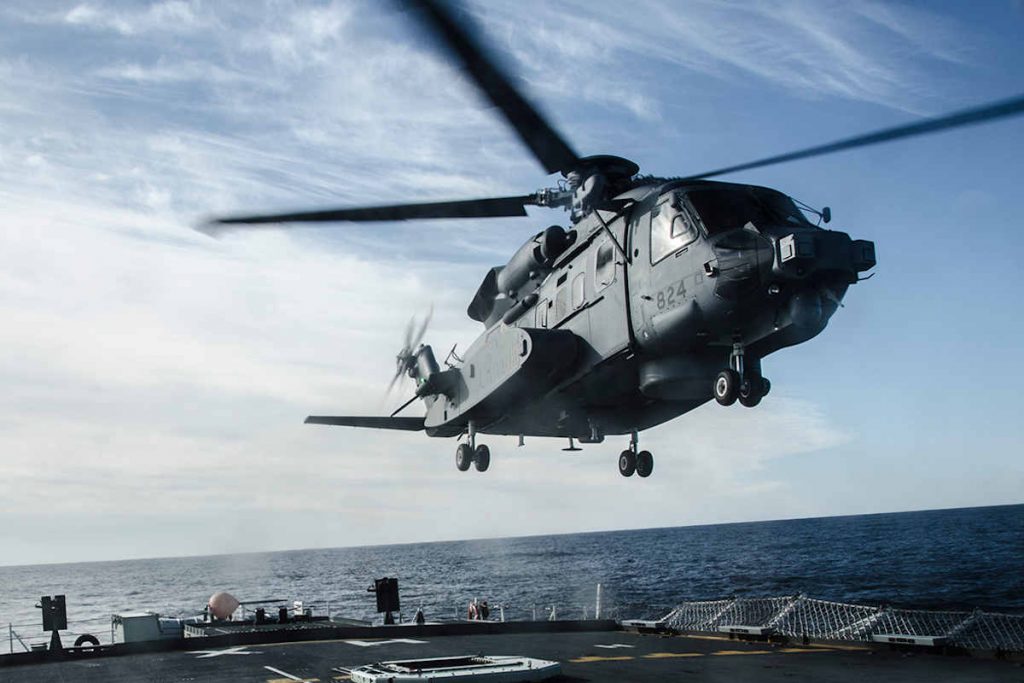
Features
Cyclone mechanical failure ruled out, operational pause lifted
June 17, 2020 By Helicopters Staff
 A CH-148 Cyclone helicopter practices landing procedures off the coast of Halifax in January 2016. (Photo: Ordinary Seaman Raymond Kwan, Government of Canada)
A CH-148 Cyclone helicopter practices landing procedures off the coast of Halifax in January 2016. (Photo: Ordinary Seaman Raymond Kwan, Government of Canada) Canadian Armed Forces has lifted its operational pause of the CH-148 Cyclone maritime helicopter fleet, as announced on June 16 by Lieutenant-General Alain Pelletier, Commander of 1 Canadian Air Division. The Cyclone fleet was put on operational pause immediately following the April 29, 2020, fatal accident of one of the helicopters, operating as Stalker 22, off the coast of Greece during a NATO training exercise, killing all six military members on board.
Canadian Cyclone lost in Mediterranean
In its June 16 statement, DND notes information uncovered about the April 29 accident so far allows the investigative team to rule out any mechanical failure of the helicopter. Leveraging data primarily obtained from the Cyclone’s flight data recorder, DND states its investigative team was able to replicate the conditions of the April 29 accident in a CH-148 Cyclone flight simulator.
The statement continues: “This revealed that the aircraft’s flight director was set to hold a specific altitude and airspeed. Thus, during the complex manoeuvering turn to align with the ship, the pilot’s inputs were significantly different from the autopilot settings and the aircraft did not respond in a way that the crew was expecting.”
These findings surrounding the complex manoeuvering of Stalker 22 just prior to landing on the frigate HMCS Fredericton were also included, in part, in a June 8 From The Investigator (FTI) preliminary report provided by DND’s Airworthiness Investigative Authority. The FTI states, that as the aircrew began a final left turn to set-up for an approach with the HMCS Fredericton, the helicopter did not respond as they would have anticipated. This happened at an unrecoverable, low altitude and the helicopter entered into a high-energy descent before impacting the water astern of the ship.
DND preliminary report on fatal RCAF Cyclone accident
In its June 16 statement, DND notes the investigative team has confirmed that this rare anomaly only occurred under a very specific and narrow set of circumstances; and that the Stalker 22 crew would have had no previous exposure or experience on how to handle this situation.
With these circumstances understood, the Royal Canadian Air Force (RCAF), which held Stalker 22 in its 423 Maritime Helicopter Squadron based at 12 Wing Shearwater in Halifax, completed a detailed risk assessment and is implementing mitigation measures to allow for the resumption of flying operations. The RCAF, however, is making a number of updates to training, publications, and operational maneuvering that together decrease the risk to what DND describes as an acceptable level for the resumption of flying operations.
DND notes, that while it cannot provide more details about the ongoing crash investigation, these updates will increase aircrews’ awareness of the possible risk identified by the Director of Flight Safety, how to avoid it during flying operations, and how to recover it if does happen. Changes to aircrew and aircraft publications, according to DND, will deal with specific procedures for aircrew to follow.
RCAF aircrew will also receive ground training and go through simulator scenarios, states DND, that will allow them to practice identifying specific flight conditions and taking recovery actions. Given the length of the operational pause, aircrew will also perform shore-based flight training to rebuild flying proficiency and regain currency. The DND notes changes in operational maneuvering of the aircraft will further mitigate risk while not affecting the Cyclone’s ability to effectively conduct operations at sea.
“The Canadian Armed Forces continues to mourn the six members we so tragically lost on April 29. The best way we can honour them is to get back into operations in a safe and deliberate manner and carry on our maritime mission in support of the Royal Canadian Navy,” said Lieutenant-General Pelletier. “The resumption of flying for the CH-148 Cyclone fleet allows our maritime helicopter community to return to what they do best — using a leading-edge aircraft to support naval operations.”
Pelletier reiterates the Flight Safety investigation continues to work towards a more complete understanding of the April 29 accident. “As our Cyclone crews return to the air, we will continue to support the families of the fallen and their loved ones here at home,” he said.